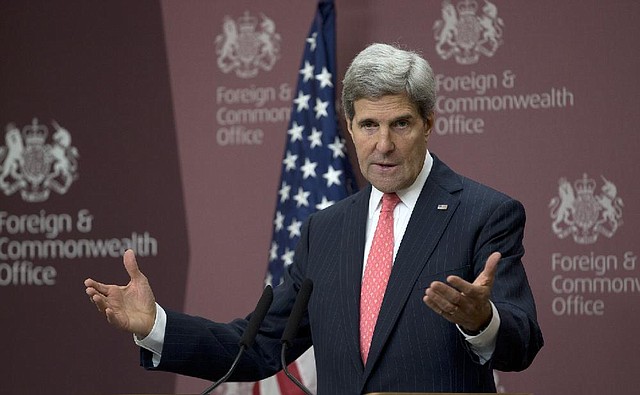Kerry optimistic on Syria talks
Opposition pushes to keep Assad, extremists from meetings
U.S. Secretary of State John Kerry speaks Tuesday at the British Foreign Office in London. Kerry said negotiations with Bashar Assad’s government are likely to take place late next month, but he would not confirm they have been set for Nov. 23, a date mentioned by other officials.
Wednesday, October 23, 2013
LONDON - Moderate opposition leaders seeking to oust Syrian President Bashar Assad from power have not yet committed to negotiations to create a new government, America’s top diplomat said Tuesday, casting new doubt on flagging hopes to end the civil war as quickly as possible.
A refusal by the Syrian National Coalition to participate in the diplomatic talks would further delay attempts by most of Syria’s regional neighbors and the West to stop the bloodshed that has so far killed 100,000 people over the past 2½ years. It also could boost the legitimacy of Assad, who after stonewalling has told allies he is prepared to negotiate - despite a near certainty that he would be removed from power as a result of the talks.
At the close of diplomatic meetings on the issue in London, U.S. Secretary of State John Kerry said he remains optimistic that the coalition would agree, potentially as soon as next week, to participate in talks tentatively set for late November in Geneva with members of Assad’s government.
But he said the Western-backed Syrian opposition members have “to make up their own mind.”
“None of us are going to prejudge or precondition what they will choose to do in that process,” Kerry said after meetings with diplomats from 11 Western and Mideast nations that are trying to broker a Syrian settlement.
Kerry’s comments came after he met with the coalition’s president, Ahmad al-Jarba, who attended the discussions.
Al-Jarba said the coalition does not want to negotiate with Assad directly, nor agree to negotiations without a set timetable. He also said he wanted only the coalition at the table to represent opposition - not extremist groups that have joined against Assad. And he objected to Iran’s participation.
The coalition appears to be getting support from patrons in the Persian Gulf for its demands of key guarantees before it consents to take part in peace talks. Chief among those backers is regional heavyweight Saudi Arabia, which is growing more frustrated with its American ally.
For Saudi Arabia, Assad’s downfall is a way to extend its influence beyond the Gulf and deal a strong blow to Iran, its regional rival.
The diplomats also released a communique outlining goals for the negotiations’ outcome. They include a mandatory requirement that Assad and his close aides have no role in a new Syrian government.
Assad has shown no sign he is ready to give up power, and declined in an interview this week to rule out running for re-election next year. He also questioned the legitimacy of the opposition given the number of foreign extremists among them.
“Who are the groups that will participate? What is their relation with the Syrian people? Do they represent the Syrian people or they represent the country that made them?” Assad said on Lebanon’s Al-Mayadeen TV. “There are many questions about the conference.”
Extremist groups, including the al-Qaida-linked cross-border Islamic State of Iraq and the Levant, have damaged the credibility of the fractured opposition to Assad and drawn battle lines among once-allied rebel forces.
In comments to reporters after the talks, British Foreign Secretary William Hague emphasized Western leaders’ support for Syria’s moderate opposition and stressed that efforts are being made to get all sides to a negotiating table in Geneva. He urged the opposition to commit itself fully to talks.
Moderate groups affiliated with the Free Syrian Army, a loose coalition of rebel brigades, are in disarray. Last week, 65 rebel groups, including many linked to the Free Syrian Army, announced they would not recognize the Syrian National Coalition in what was widely seen as a rebuke to the West for failing to send more support.
The rebels also fear that Assad’s recent willingness to let United Nations inspectors examine his government’s chemical-weapons stockpile - a cache that earlier this year he denied even existed - has helped his credibility and worldwide image.
Norway’s Foreign Ministry spokesman Ragnhild Imerslund said her country is considering a request to take the bulk of the stockpile for eventual destruction.
The U.N. and the Organization for the Prohibition of Chemical Weapons, which are working together to eliminate the arsenal, would like to see the stockpile of chemicals destroyed in one country outside Syria, Imerslund said, “but the best solution for them is not necessarily the best solution for Norway.”
She said Norway is refusing to handle chemical weapons loaded onto warheads and ready for use but is considering accepting mixed chemicals and chemical precursors that can be mixed to make deadly nerve agents.
The U.N. has informed Norway that Syria has about 55 tons of mixed chemicals in the form of mustard gas and about 330 to 550 tons of materials needed to make nerve agents.
Information for this article was contributed by Cassandra Vinograd, Lara Jakes, Diaa Hadid, Mark Lewis, Gary Peach, Bassem Mroue, Brian Murphy and Ryan Lucas of The Associated Press and by Alan Cowell and Michael R. Gordon of The New York Times.
Front Section, Pages 6 on 10/23/2013

